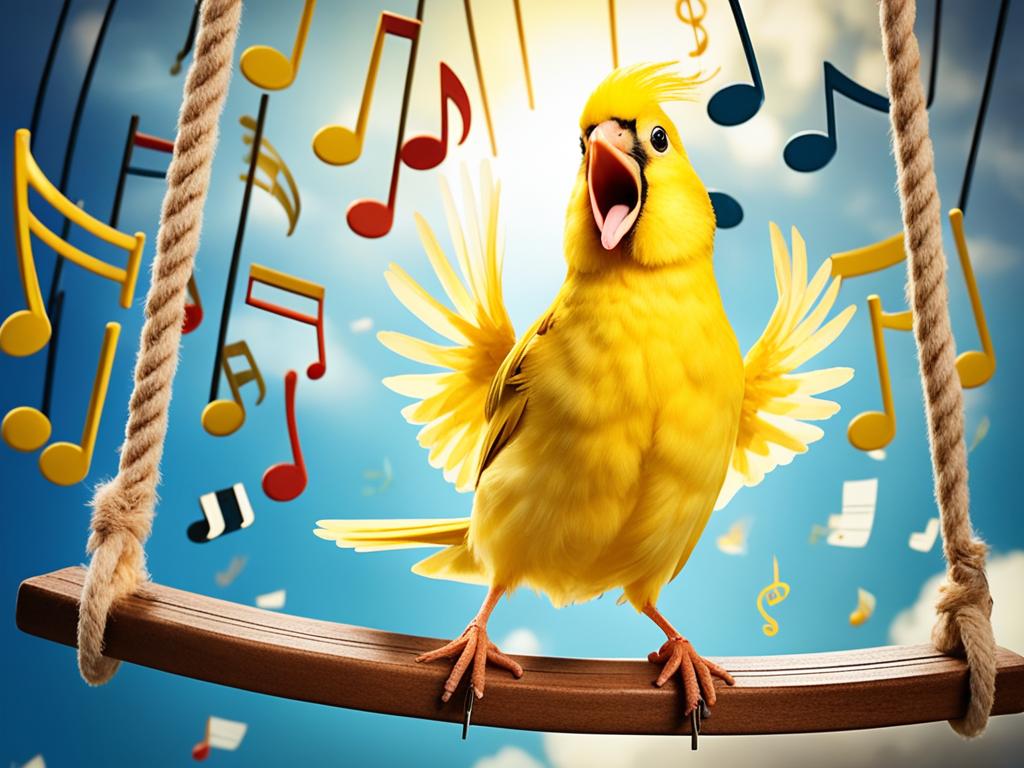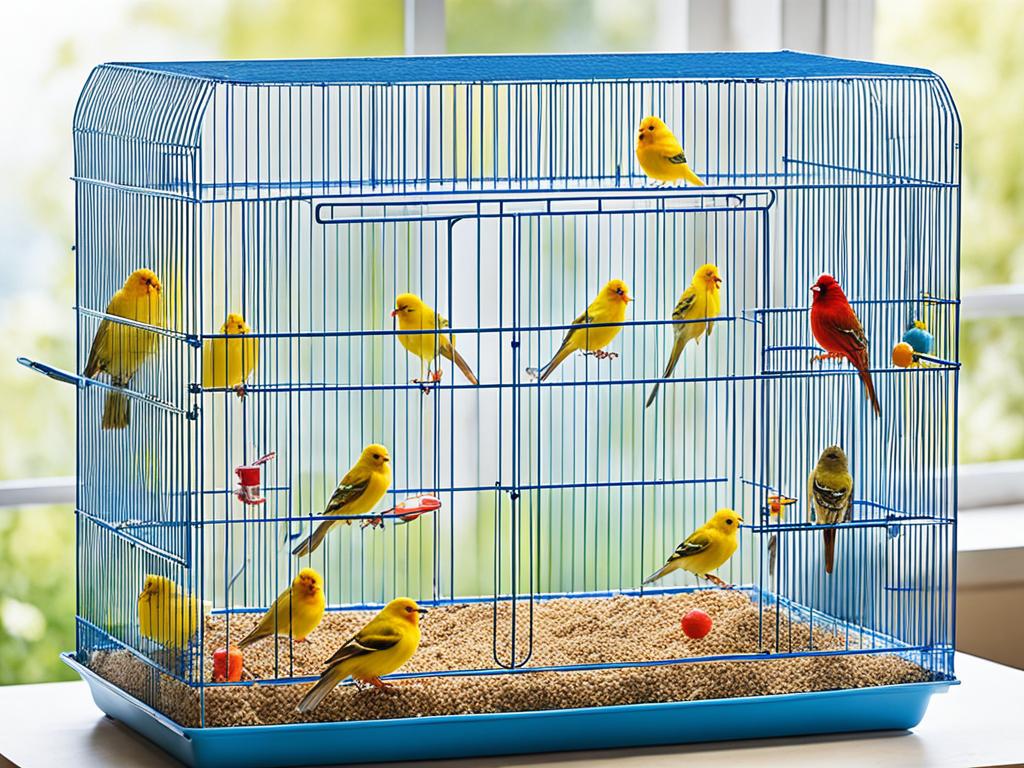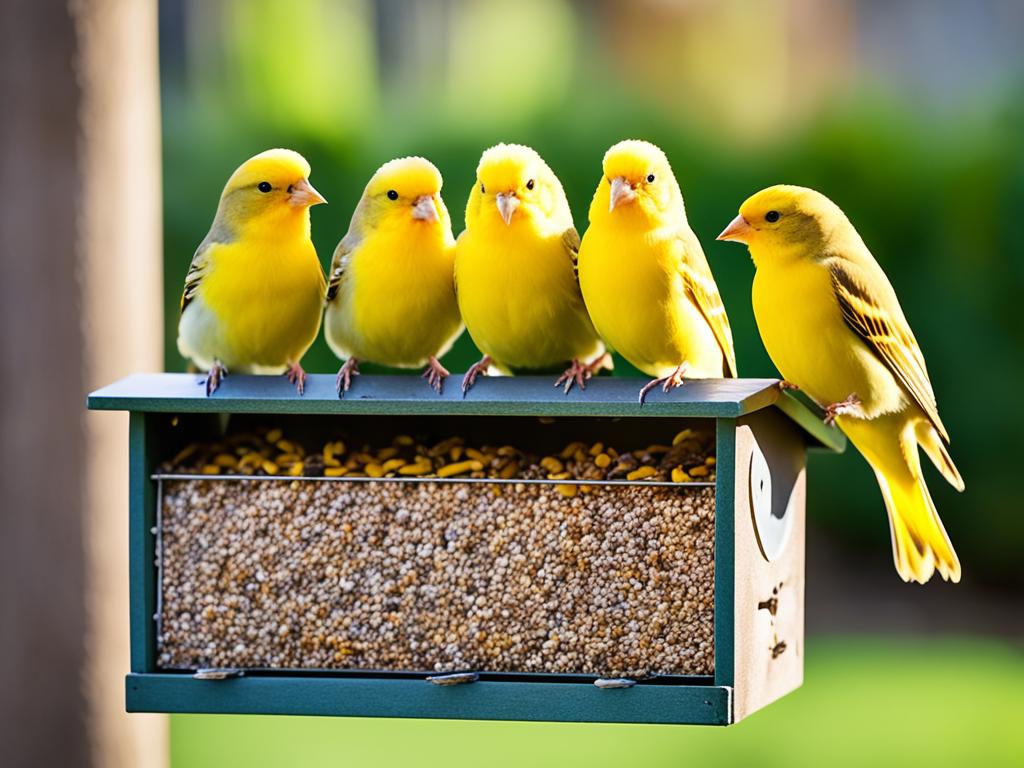Imagine waking up to the delightful sound of canaries serenading you with their melodious songs. The gentle trill and soothing melodies fill your home, creating an atmosphere of joy and tranquility. These vibrant little creatures can become the singing stars that brighten up your days and bring harmony to your heart.
Raising canaries is not just about having pet birds; it is an experience that connects you with nature’s symphony. Whether you are a seasoned bird enthusiast or new to the world of feathered companions, this article will guide you through the various aspects of raising canaries, from caring for them to training their beautiful voices.
Key Takeaways:
- Discover the joy of raising canaries and the beauty of their songs.
- Learn how to care for canaries and provide them with a suitable home.
- Explore the art of canary breeding and the excitement of raising chicks.
- Unlock the singing potential of your canaries through song training techniques.
- Create the perfect living environment for your canaries with proper cage setup and enrichment.
Canary Pet Care Tips for Beginners
If you’re new to raising canaries, this section will provide you with valuable tips on how to care for these delightful feathered friends. By following these canary pet care tips, you’ll ensure that your canaries thrive in their environment, bringing a chorus of songs and joy into your home.
Setting Up the Perfect Canary Cage
Creating a suitable living space is essential for canaries to feel comfortable and safe. Start by selecting a spacious cage that allows them to fly and move around freely. Ensure that the cage bars are spaced appropriately to prevent any entanglement or injury. Place the cage away from direct sunlight and drafts to maintain a stable temperature. Don’t forget to line the cage floor with a clean, bird-safe substrate or liner.
Providing a Nutritious Diet
A balanced diet is crucial for your canaries’ health and well-being. Offer them a high-quality canary seed mix as a staple food source. Enhance their diet with fresh fruits and vegetables, such as apples, carrots, and leafy greens, to provide essential vitamins and minerals. Additionally, ensure a constant supply of fresh, clean water. Avoid giving your canaries foods that are toxic to birds, such as chocolate or avocado.
Care for Their Physical and Mental Health
Regular exercise is vital for keeping your canaries physically fit. Provide them with ample opportunities to stretch their wings and fly. Place perches of various sizes and textures within the cage to promote foot health and exercise. Additionally, include engaging toys and puzzles to keep your canaries mentally stimulated and prevent boredom. Interacting with your canaries daily through gentle handling and talking to them can also contribute to their emotional well-being.
Regular Grooming and Health Checks
Canaries are generally good at self-grooming, but it’s essential to keep an eye on their condition. Regularly trim their nails if they become overgrown, being careful not to cut into the quick. Check their beaks for any abnormalities or overgrowth, which may require professional attention. Schedule regular visits to an experienced avian veterinarian for overall health check-ups and ensure vaccinations are up to date.
A Peaceful Environment
Canaries are sensitive to noise and disturbances, which can impact their overall well-being. Keep their cage in a quiet area of the house, away from loud TVs or busy hallways. Limit exposure to any harmful airborne substances, such as cigarette smoke or aerosol sprays, as they can be detrimental to their respiratory health. Maintain a calm and peaceful environment to promote their natural singing abilities.
“Raising canaries is a rewarding experience that requires care, patience, and a genuine love for these beautiful birds. By implementing these canary pet care tips, you’ll create a nurturing environment that allows their vibrant personalities and melodious songs to flourish.”
Essential Canary Pet Care Tips Summary:
- Set up a spacious and safe cage for your canaries, away from direct sunlight and drafts.
- Provide a high-quality canary seed mix as their main diet and supplement with fresh fruits and vegetables.
- Offer opportunities for physical exercise and mental stimulation through perches, toys, and interactive play.
- Regularly trim nails, check beaks, and schedule health check-ups with an avian veterinarian.
- Create a peaceful environment free from loud noise and harmful substances.
Canary Breeding Guide
Breeding canaries is not only a fascinating endeavor but also a rewarding experience for bird enthusiasts. Whether you’re looking to expand your canary family or simply enjoy the miracle of new life, this section will provide you with a comprehensive guide to canary breeding.
Selecting Compatible Mates
When it comes to canary breeding, choosing the right mates is crucial for successful reproduction. Select canaries that are healthy, of the appropriate age, and display desirable traits such as vibrant colors and melodious songs. Keep in mind that opposite sexes should be paired, ensuring their compatibility and reducing the risk of aggression.
Introduce potential mates gradually, allowing them to become familiar with each other’s presence. Observe their interactions closely to ensure they form a bond. Once a compatible pair is established, prepare the breeding environment.
Creating Suitable Nesting Conditions
To encourage canaries to breed, it is essential to create a suitable nesting environment. Install nest boxes in the cage, providing a cozy and secure space for the breeding pair. The nest box should be appropriately sized for the canary breed, with an entrance hole large enough for the female canary to enter comfortably.
Fill the nest box with nesting materials such as soft hay, coconut fiber, or shredded paper. These materials will help provide insulation and comfort for the eggs and newborn chicks. Avoid using materials that could be harmful, such as cotton or fabrics that can entangle the small hatchlings.
Caring for the Eggs and Newborn Chicks
Once the female canary lays her eggs, it is essential to provide optimal care to ensure their successful development. Maintain consistent temperature and humidity levels in the breeding environment. Regularly check the eggs for fertility by gently candlelighting them. Infertile eggs should be removed to prevent contamination or potential health issues.
During the incubation period, it is crucial to provide a balanced diet rich in essential nutrients to the breeding pair. Fresh fruits and vegetables, high-quality seeds, and a calcium source are vital for the health of both the parents and the growing chicks.
After hatching, the chicks will be dependent on their parents for warmth, food, and protection. Monitor their growth and development closely, ensuring they receive adequate nutrition. As the chicks mature, they may need additional space and individual cages to avoid overcrowding and territorial disputes.
By following this comprehensive canary breeding guide, you’ll be able to create a nurturing environment for your canaries and witness the beautiful journey of new life. Breeding canaries not only enhances your understanding of these remarkable birds but also deepens the bond you share with them. Embrace the wonders of canary reproduction and revel in the joy of raising a new generation of singing stars.
Canary Bird Song Training Techniques
Canaries are revered for their ability to produce beautiful melodies that can enchant any listener. If you’re a canary owner, you may be eager to unlock the full singing potential of your feathered friends. In this section, we’ll explore various techniques to train canaries to sing melodious tunes, allowing them to become true singing stars in your home.
Training your canaries to sing involves patience, consistency, and a deep understanding of their natural instincts and behaviors. By following these proven techniques, you’ll be well on your way to enjoying the captivating songs of your canaries:
- Socialize and Bond: Canaries are social creatures and thrive on human interaction. Spend time with your canaries daily, talking to them and playing gentle music, which can stimulate their singing abilities.
- Imitate Sounds: Canaries have a natural talent for imitating sounds they hear. Play recordings of canary songs or other melodic sounds to inspire their repertoire and encourage them to mimic the tunes.
- Consistent Training Sessions: Establish a regular training routine and dedicate a specific time each day for training sessions. Keep the sessions short initially, gradually increasing the duration as your canaries become more comfortable.
- Positive Reinforcement: Reward your canaries with treats, praise, and attention whenever they exhibit singing behavior. This positive reinforcement will reinforce their desire to continue singing.
- Gradual Song Teaching: Start by teaching your canaries simple melodies, gradually increasing the complexity of the songs. Use repetition and consistency during training to reinforce the desired song patterns.
- Be a Role Model: Canaries learn by observation, so be a role model for them. Sing or whistle softly to demonstrate the desired melodies, and they may follow suit.
Expert Tip:
To optimize the training process, place your canary cage in a calm and quiet area of your home where they can focus on their singing and minimize distractions.
Remember, every canary is unique, and their singing abilities may vary. Some canaries may naturally have a greater propensity for singing, while others may require more practice and guidance. With patience, consistent training, and a positive approach, you can help your canaries develop their singing skills and create a melodic ambiance in your home.

Setting up the Perfect Canary Cage
Creating a suitable living environment is crucial for the well-being of your canaries. By setting up the perfect canary cage, you can ensure that your feathered friends are comfortable and content. Here are some essential guidelines and considerations for providing an optimal habitat for your canaries.
Cage Size
The size of the cage plays a vital role in the well-being of canaries. It is recommended to select a cage that provides ample space for your canaries to move around, stretch their wings, and exercise. A spacious cage allows for natural behaviors and helps prevent boredom and stress. The minimum recommended cage size for a single canary is 18 inches long, 18 inches wide, and 24 inches tall. If you plan to house multiple canaries, ensure the cage is large enough to accommodate them comfortably.
Cage Placement
Choosing the right location for your canary cage is essential. Place the cage in a well-ventilated area, away from drafts and direct sunlight, as extreme temperatures can be harmful to canaries. Additionally, avoid placing the cage in noisy areas or near household appliances that produce loud sounds or vibrations, as this may stress your canaries and disrupt their natural behavior.
Placing the cage at eye level or slightly higher not only allows you to observe your canaries easily but also helps them feel more secure and engaged with their surroundings. Consider positioning the cage in a room where your canaries can enjoy the company of family members, as they are social creatures that thrive on interaction.
Cage Accessories
Adding accessories to your canary cage provides enrichment and stimulation for your birds. Provide perches of varying sizes and textures to mimic the natural environment and promote foot exercise. Canaries also enjoy swings and ladders, which offer additional opportunities for physical activity and play.
Include a shallow dish for bathing, as canaries, like other birds, enjoy bathing to keep their feathers clean and healthy. You can provide a specialized birdbath or a shallow dish filled with lukewarm water to create the perfect bathing spot for your canaries.
Environmental Enrichment
Creating a stimulating environment is essential for the mental well-being of your canaries. Offer a variety of safe and suitable toys, such as bells, mirrors, and puzzles, to keep your canaries entertained and engaged. Rotate the toys regularly to prevent boredom and ensure a stimulating environment.
Additionally, providing natural foliage or artificial plants inside the cage can create a sense of security and mimic the canaries’ natural habitat. Ensure that any plants or decorations you choose are non-toxic and do not contain any small parts that can be ingested.
“The well-being of canaries greatly depends on the environment they are kept in. A thoughtfully designed cage not only meets their physical needs but also provides mental stimulation and comfort.” – Audubon
Remember to clean the cage regularly to maintain cleanliness and hygiene. Remove any uneaten food, droppings, and soiled lining promptly to prevent the spread of bacteria and maintain a healthy living environment for your canaries.

| Cage Setup Tips | Benefits |
|---|---|
| Choose an appropriate cage size | Allows for natural behaviors Prevents boredom and stress |
| Place the cage in a suitable location | Provides comfort and safety Avoids extreme temperatures and noise |
| Add perches, swings, and ladders | Promotes foot exercise and play |
| Provide a birdbath or shallow dish for bathing | Keeps feathers clean and healthy |
| Offer a variety of toys | Ensures mental stimulation and entertainment |
| Include natural foliage or artificial plants | Creates a sense of security and mimicry of natural habitat |
Providing the Best Food for Canaries
A healthy diet is crucial for canaries to thrive and maintain their beautiful singing abilities. By feeding them the right food, you can ensure their overall well-being and enhance their vibrant colors. When it comes to raising canaries, choosing the best food is essential for their nutritional needs and long-term health. Here, we will explore the dietary requirements of these delightful birds and recommend the top food options that will keep them happy and healthy.
“Canaries have specific dietary needs that must be met to support their singing and vitality. Just like humans, canaries require a balanced diet that includes a variety of nutrients.”
The Basics of Canary Nutrition
Canaries have a unique digestive system that requires a high-quality diet rich in seeds and other essential nutrients. A combination of fortified seed mixes and fresh foods is ideal for meeting their nutritional needs. Seeds should form the primary component of their diet, but it’s essential to supplement this with fresh produce to provide them with a diverse range of nutrients.
Top Food Options for Canaries
To ensure your canaries receive the best nutrition, consider incorporating the following food options into their diet:
- Fresh Vegetables: Offer a variety of vegetables such as spinach, kale, carrots, and broccoli. These vegetables are rich in vitamins and minerals essential for their overall health.
- Leafy Greens: Canaries enjoy greens like lettuce, dandelion leaves, and Swiss chard. These leafy greens provide additional nutrients and act as a source of hydration.
- Grains: Include cooked grains like quinoa, millet, and whole wheat pasta to diversify their diet and provide healthy carbohydrates.
- Fruits: Offer small amounts of fruits such as apples, berries, and melons as occasional treats. These fruits provide natural sugars and additional vitamins.
- Egg Food: Canaries can benefit from egg food, which is a protein-rich supplement containing essential amino acids. This is particularly important during breeding season or for canaries recovering from illness.
- Pellets: High-quality canary pellets, available in pet stores, can provide a well-balanced nutritional profile. These pellets contain a combination of seeds, grains, and other essential nutrients.
It’s important to note that while seeds are a crucial part of a canary’s diet, they should not make up the entire food offering. The ideal diet for canaries involves a balance between seeds, fresh foods, and pellets. This combination ensures they receive a diverse range of nutrients that support their overall health and singing abilities.
By feeding your canaries a nutritious diet, you contribute to their well-being and happiness, allowing them to thrive as the singing stars of your home. Always consult with an avian veterinarian or refer to reputable sources, like PetMD, for specific nutritional recommendations for your canaries.
Canary Health Issues and Care
Like any pet, canaries can face health issues. It is essential to understand common problems that canaries may encounter and how to prevent and address them. Regular health checks, recognizing signs of illness, and providing proper care are crucial for keeping your canaries in optimal condition.
When it comes to canary health, prevention is key. Providing a clean and safe environment is the first step in minimizing health risks. Make sure the cage is spacious enough for your canaries to move around comfortably. Regularly clean the cage and accessories, and provide fresh food and water daily.
“A healthy diet is vital for canary health. Feed your canaries a balanced diet that includes a variety of seeds, pellets, fresh fruits, and vegetables. Avoid processed foods that may contain harmful additives.”
To ensure the overall well-being of your canaries, it is important to schedule regular vet check-ups. A avian veterinarian can perform thorough examinations, including checking for signs of illness, assessing their weight, and addressing any concerns you may have. They can also provide advice on appropriate vaccinations and parasite prevention.
Be attentive to changes in your canary’s behavior and appearance. Unexplained weight loss, decreased appetite, lethargy, abnormal droppings, excessive feather plucking, or difficulty breathing may indicate health problems. If you notice any of these signs or suspect your canary is unwell, consult an avian veterinarian promptly.
It is advisable to have a first aid kit specifically tailored to birds on hand. The kit should include items such as styptic powder to stop bleeding, antiseptic solution for cleaning wounds, and an avian-safe bandage material. However, always consult with a veterinarian before administering any treatments or medications to your canaries.
Grooming and Hygiene
In addition to regular cage cleaning, maintaining proper grooming and hygiene practices is essential for canary health. Trimming their nails when necessary helps prevent overgrowth, which can cause discomfort or even injury. Regularly inspect their beaks, feet, and feathers for any abnormalities, and consult a veterinarian if you notice any issues.
Bathing is an important part of canary hygiene, as it helps keep their feathers clean and in good condition. Provide a shallow dish or birdbath with lukewarm water for your canaries to bathe in. Alternatively, you can use a spray bottle to mist them gently. However, ensure that they have access to warmth after bathing to prevent them from getting chilled.
When it comes to canary health, knowledge is power. By understanding common health issues, practicing preventive care, and seeking veterinary assistance when needed, you can ensure that your canaries lead happy and healthy lives.
| Common Health Issues | Symptoms | Prevention and Care |
|---|---|---|
| 1. Respiratory Infections | Coughing, sneezing, labored breathing, nasal discharge | Provide good ventilation, avoid exposure to drafts, maintain clean environment |
| 2. Feather Mites or Lice | Excessive scratching, feather damage | Regularly clean cage and accessories, use avian-safe parasite treatments |
| 3. Vitamin A Deficiency | Dull feathers, eye and respiratory problems | Feed a variety of fresh fruits and vegetables rich in vitamin A |
| 4. Overgrown Beaks or Nails | Difficulty eating, discomfort, injuries | Trim beaks and nails regularly or consult a veterinarian for assistance |
Sources: petmd.com
Conclusion
By following the tips and guidance provided in this article, you’ll be well-equipped to raise canaries as the singing stars of your home. Whether you’re a beginner or an experienced pet owner, the joy of canary ownership awaits you.
From canary pet care tips for beginners to a comprehensive breeding guide, you now have a solid foundation to provide the best care for your feathered friends. With patience and training techniques, you can unlock the enchanting melodies that canaries are famous for.
Remember to set up the perfect canary cage, providing them with a suitable living environment that fulfills their habitat requirements. And don’t forget about their nutrition – providing the best food for canaries is essential for their overall health and well-being.
Lastly, stay vigilant about canary health issues and provide regular care. By understanding the signs of illness, you can address any concerns promptly and ensure your canaries lead healthy lives.
Now, it’s time to embrace the joy of raising canaries and bring melodious tunes into your home. Happy canary ownership!




